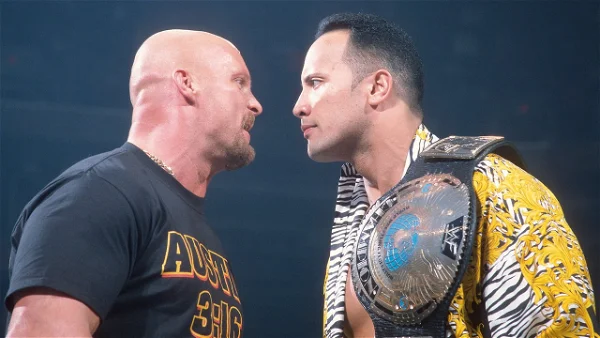
On a recent edition of his “Kliq This” podcast, WWE Hall of Famer Kevin Nash discussed the ripple effects of Steve Austin suffering a neck injury at WWE SummerSlam 1997.
Nash said, “If Steve doesn’t get hurt, I don’t think Rock hits the f***in’ heights that he does. Like everything happens for a reason, because, basically … I mean, not to be a d***, but Rock has came out and said that when he sees something that gets over, he takes it. When Steve went down with the neck injury, f***in’ Dwayne took a lot of f***in’ Steve’s s*** and incorporated it into what he did. And lo and behold, Steve comes back.”
The WWE SummerSlam 1997 match saw Owen Hart botch a tombstone piledriver, compacting Austin’s head into the mat, leading to temporary paralysis and subsequent neck issues that plagued “Stone Cold” for the remainder of his career.
The Impact of Steve Austin’s Neck Injury on The Rock’s Career
In the world of professional wrestling, injuries are an unfortunate reality that can have a significant impact on a wrestler’s career trajectory. One such injury that had far-reaching consequences was Steve Austin’s neck injury at WWE SummerSlam 1997. This injury not only changed the course of Austin’s career but also played a crucial role in propelling another wrestling icon, The Rock, to new heights.
During a recent episode of his podcast “Kliq This,” WWE Hall of Famer Kevin Nash shed light on the ripple effects of Austin’s injury. Nash stated, “If Steve doesn’t get hurt, I don’t think Rock hits the f***in’ heights that he does.” This statement highlights the interconnectedness of the wrestling world and how one event can shape the careers of multiple individuals.
The incident in question occurred during the WWE SummerSlam 1997 match between Austin and Owen Hart. In a tragic turn of events, Hart botched a tombstone piledriver, causing Austin’s head to be compacted into the mat. The impact resulted in temporary paralysis for Austin and marked the beginning of his ongoing struggles with neck issues.
Austin’s injury forced him to take a hiatus from wrestling to recover and undergo extensive rehabilitation. During this time, Dwayne “The Rock” Johnson, who was rising through the ranks of WWE, saw an opportunity to fill the void left by Austin’s absence. As Nash mentioned in his podcast, The Rock took elements of Austin’s character and incorporated them into his own persona.
The Rock’s ability to adapt and incorporate Austin’s popular traits into his own wrestling style played a pivotal role in his ascent to stardom. The charismatic and electrifying persona that The Rock developed resonated with audiences, leading to his meteoric rise in popularity. It is worth noting that The Rock himself has acknowledged this influence, stating that when he sees something that gets over, he takes it.
However, Austin’s injury and subsequent recovery also played a significant role in shaping his own career. The time away from the ring allowed Austin to rejuvenate and refine his character, leading to his iconic “Stone Cold” persona. When Austin made his triumphant return to the WWE, he brought a renewed energy and intensity that captivated fans worldwide. The rivalry between Austin and The Rock became one of the most memorable and influential feuds in wrestling history.
The impact of Austin’s injury on The Rock’s career serves as a reminder of the interconnected nature of professional wrestling. Injuries can create opportunities for other wrestlers to step up and fill the void left by their injured counterparts. The Rock’s ability to seize this opportunity and incorporate elements of Austin’s character into his own persona showcases the adaptability and creativity required to thrive in the wrestling industry.
In conclusion, Steve Austin’s neck injury at WWE SummerSlam 1997 had far-reaching consequences that not only affected his own career but also played a crucial role in propelling The Rock to new heights. The injury forced Austin to take a hiatus, allowing The Rock to incorporate elements of Austin’s character into his own persona. This turn of events shaped both wrestlers’ careers and resulted in one of the most iconic rivalries in wrestling history.
